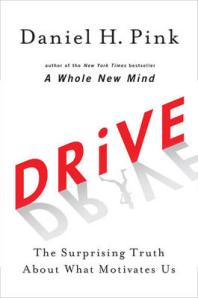For my last post, I simply passed along a video summary of the book Drive (Pink), that Zoe Weil had posted on the blog Cooperative Catalyst. Zoe said, “When learning becomes its own motivation and reward, we’re golden, and when we realize this simple fact and hire engaging teachers who love to learn and love to share their learning, and abandon our carrot and stick approach in schools, we may find that our students astonish us with their capacity to learn, produce new ideas, and go on to teach what they know to others.” The video: RSA Animate YouTube film Daniel Pink shares what really motivates us.
I finished reading Pink’s most recent book, Drive. He says, “If we want to equip young people for the new world of work—and, more important, if we want them to lead satisfying lives—we need to break Motivation 2.0’s (carrots and sticks—the incentive of good grades, or the fear of bad grades, and the incentive of greater privileges and the fear of removal of privileges) grip on education and parenting.”
Pink has some specific suggestions for educators. From Drive:
The Homework Test
- Am I offering students any autonomy over how and when to do this work?
- Does this assignment promote mastery by offering a novel, engaging task (as opposed to rote reformulation of something already covered in class)?
- Do my students understand the purpose of this assignment? That is, can they see how doing this additional activity at home contributes to the larger enterprise in which the class is engaged?
If you really think about these questions as you plan for learning you can attempt to change homework into “homelearning.”
“Fed Ex Day” (once a quarter)
You can inject a burst of autonomy into your classroom by setting aside a day each quarter when students can work on any project they choose, however they want, with whom ever they’d like. Ask kids to come up with a problem to solve or a project to tackle. In advance, help them collect/identify the tools, information, and supplies they might need. Ask them to deliver by reporting to the class their discoveries and experiences.
DIY Report Cards
At the beginning of a semester, ask students to list their top learning goals. Then at the end of the semester, ask them to create their own report card along with a one or two paragraph review of their progress. Where did they succeed? Where did they fall short? What more do they need to learn? Once students have completed their DIY report cards, show them the teacher’s report card, and let the comparison of the two be the start of a conversation on how they are doing on their path toward mastery. You could include parents in the conference.
Offer Praise the Right Way
- Praise effort and strategy, not intelligence.
- Make praise specific.
- Praise in private.
- Offer praise only when there’s a good reason for it. (“You can’t kid a kid.”)
Help Kids See the Big Picture
Whatever they are studying make sure they can answer these questions: Why am I learning this? How is it relevant to the world I live in now? Then get them out into the “real world” so they can apply what they’re studying. Think of it as the fourth R: reading, writing, arithmetic…and relevance.
Helping kids see the big picture is echoed by many: Covey (The 7 Habits: Begin With the End in Mind), Gray (Getting Real: Helping Teens Find their Future), Wiggins and McTighe (Understanding by Design), Daggett (Model Schools)…I sure there are more. As Tom Friedman once said during a discussion about his book, The World is Flat, “Why isn’t anybody telling the kids?” Why do we so often forget to tell the kids?
Autonomy, Mastery, Purpose–Drive, the suprising truth about what motivates us. How do you motivate yourself? Recommended reading for anyone interested in the science motiviation.
Filed under: Curriculum and Instruction | Tagged: 21st Century Skills, 7 Habits, Big Picture, Drive, Homework, instruction, learning, Motivation, Pink, UbD |



Leave a comment